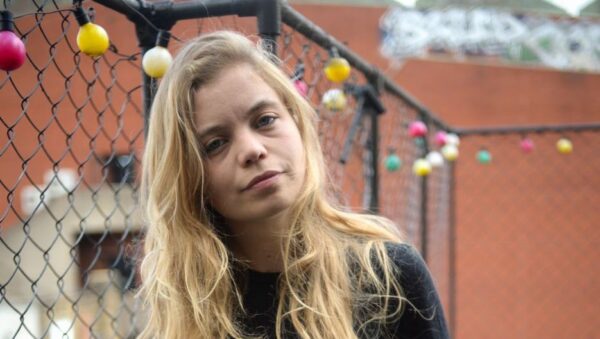 United Kingdom Héloïse Werner (soprano) and friends: Héloïse Werner (soprano), Max Baillie (violin/viola), Colin Alexander (cello), Misha Mullov-Abbado (double bass), Bruno Heinen (piano), Angela Wai Nok Hui (percussion). Wigmore Hall, London, 9.4.2025. (CC)
United Kingdom Héloïse Werner (soprano) and friends: Héloïse Werner (soprano), Max Baillie (violin/viola), Colin Alexander (cello), Misha Mullov-Abbado (double bass), Bruno Heinen (piano), Angela Wai Nok Hui (percussion). Wigmore Hall, London, 9.4.2025. (CC)

Colin Alexander – moonrise / Alva’s Riff (2025, world premiere)
Hildegard of Bingen – O vis eternitatis (arr. Alexander/Werner)
Max Baillie – Make sweet floods to run (2025, world premiere)
Bruno Heinen – What Happens Now?
Héloïse Werner – Mixed Phrases (2011, arr. Alexander/Werner)
Errollyn Wallen – Rain
Angela Wai Nok Hui – Just let me die a lil (2025, arr. comp.)
Misha Mullov-Abbado – A Darting Fear (2023)
This was a spectacular feast of talent on display. Héloïse Werner needs little introduction, and the programme is typical of her questing spirit.
It began with two pieces by cellist and composer Colin Alexander: moonrise and the world premiere of Alva’s Riff. A musical evocation of indeed a moon rising above a rippling sea forms the inspiration for the first of the two: Alexander creates a sea of ripples. Working with motivic cells, Alexander creates an ambient mass of sound, hyper-beautiful. It was followed, seamlessly, by Alva’s Riff, a piece written to celebrate the birth of a child of two friends, pizzicato patterning morphing into a melody; the whole comprises manipulations of the dedicatee’s name.
The arrangement of music by Hildegard of Bingen is most effective, cello providing a drone (which gets doubled). Werner sings with little to no vibrato, as befits the material (albeit via a contemporary lens); less, I believe, than on her recording on the Delphian disc, Close-ups. The title is O vis eternitatis (O power of eternity), and indeed the power is huge, the timelessness complete.
The piece disappears into silence, from which emerges a work Inspired by the music of Mali, Max Baillie’s Make sweet floods to run uses pizzicato to imitate Malian ngoni traditions, an astonishingly inventive feint. Finally for the first part, Bruno Heinen’s What Happens Now?, inspired by T. S. Elliot is a six-minute exploration of repetition and jazz (it reminded me somewhat of Harold Budd). Angela Wai Nok Hui created a plethora of percussion colour, underpinned by Alexander’s double bass.
Werner included Mixed Phrases on her album Phrases, heard here in a new arrangement by the composer and Colin Alexander. The text is Rimbaud (from Les Illuminations). The work was commissioned by Lawrence Power as part of his Lockdown Commissions project. As Werner explains, ‘As a French person living in the UK, I’m interested in the interplay between language and identity, especially in performance. Mixed Phrases draws on this dichotomy as it moves between two parallel worlds. In one instance, we find ourselves in a familiar world, right here on earth, featuring the rich sound of the viola and words by Arthur Rimbaud (a section of ‘Phrases’ from Illuminations). In the next, we are in a more unfamiliar place, somewhere higher in the sky, the ethereal violin lines becoming entangled in a new reconstructed language; Rimbaud’s words again but this time fragmented, internalised and reformed.’ It is also virtuoso for the voice; Werner effectively asks herself to take on several voices, almost simultaneously (which she did with virtuoso plomb). Baillie’s superb viola playing, so expressive, added huge depth. It was interesting to hear the work live; the recording on Delphin seems to have just a touch too much reverb, and it was even more effective at the Wigmore Hall.
Errollyn Wallen’s music never fails to stimulate; memories of Dido’s Ghost come flooding back. Heard here in a 2023 revision, her Rain (1998) begins with a plateau of silence, here so perfectly quiet (you can hear the original on her album Meet Me at Harold Moores). Eventually, the song comes into focus. How perfect was Werner’s rendition of this late-night, smoky jazz room piece. It is certainly very different from the wonderful, zany composition by percussionist Angela Wai Nok Hui. Just let me die a lil is extraordinary, a whole new vocabulary of sounds. The composer explains: ‘Feeding back with my own heartbeat. The vibration goes through my body, using my own body as the resonance box for the loud sounds. As loud as a church bell, as loud as your world could bear … it’s like falling in love, but we are stuck in the falling part’. There is much beauty here.
Finally, Misha Mullov-Abbado’s A Darting Fear. The text concerns the sudden realisation of a profound loss; it was a fittingly thought-provoking close, an attempt to convey the unconveyable.
A remarkable evening. Werner’s imagination – and technique when performing – seem to know no bounds, and she surrounds herself with very much like-minded people.
Colin Clarke
